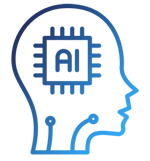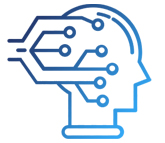- AI

Artificial Intelligence

Smart Products & Services
We follow Smart Products & Services

Intelligent Business Functions & Processes
We follow Intelligent Business Functions & Processes

Robotic Process Automation
We follow Robotic Process Automation

Personalized
healthcareWe follow Personalized healthcare

Identifying at-risk patients
We follow Identifying at-risk patients

Optimized routing and scheduling
We follow Optimized routing and scheduling
- ML

Machine Learning

Predictive
AnalyticsWe follow Predictive Analytics

Service Personalization
We follow Service Personalization

NLP
We follow NLP (Natural Language Processing)

Stock Market Forecasting
We follow Stock Market Forecasting

Fraud Prevention
We follow Fraud Prevention

Recommender engines
We follow Recommender engines
- blockchain
- IOT

Internet of Things
- AR
- Business Solutions

Business Solution

Business Performance Management
We follow Business Performance Management

Decision Making & Big Data Analytics
We follow Decision Making & Big Data Analytics

Enterprise Data Management
We follow Enterprise Data Management
- Apps

Apps

Native Apps
We follow Native Apps

Cross Platform Apps
We follow Cross Platform Apps

Web Apps
We follow Web Apps

Hybrid Apps
We follow Hybrid Apps

Cloud Native Apps
We follow Cloud Native Apps
- Lab

How Blockchain App Development Can Be Beneficial For Food Industry?
Blockchain has been used by a number of industry verticals, including banking and financial services, healthcare & hospital automation services, government sectors, and the global supply chain. We are grateful for the inventors who are pursuing fresh concepts so that technology might be better used to the food industry and other sectors. According to Statista consumer forecast, global food sales are expected to keep growing over the coming years and will total over 11.1 trillion dollars in 2027.
While others are attempting to implement such cutting-edge and secure digital systems, some of the top tech businesses have already begun leveraging technology in the food system. As a result, the market saw an increase in demand for blockchain app development company, and blockchain developers.
Describe Blockchain
A decentralised distributed ledger that keeps track of all transactions in the network is how blockchain technology is best described. Due to the distributed nature of the technology, no single entity owns or controls it, unlike with centralised systems where either the government or a brand has total access to the transactional data.
Each participant in the network has its own copies of the records in the blockchain distributed ledger, and if permitted, they can access the supply chain. Overall, blockchain technology is an open network that enables its users, whether they are actors, suppliers, or customers, to access data records.
How Effective Is Blockchain?

Each participant in the blockchain system has their own copies, allowing them to administer their own chain. Each actor on the chain will be able to detect the change and take appropriate action in the event that any node is compromised at the security level.
A blockchain system’s advantage over a central, one-body-regulated system is that it allows data visibility across numerous locations.
If such an attack or manipulation occurs, the other network members could immediately recognise that A has been switched to B. When we discuss Bitcoin, we are referring to a cryptocurrency that utilises the same Blockchain IoT technology strategy. Nonetheless, there is a distinction between the two of them. Individuals utilise it to access related info and purchase bitcoins all over the world. It implies that visibility and transparency are shared, however this is not the case with blockchain. Transparency in the blockchain is only available to network members.
As a result, when you sign up for the network, you agree that you have the right to see any information that the group permits. Even if the data is open and transparent, unlike Bitcoin, where anyone may access it anywhere, the general public won’t be able to see it. Consequently, it’s crucial to sign a contract to have access to the network’s blockchain and its data.
Why is the Food Industry Using Blockchain?
The food system is a chain or a network of linked chains, similar to the blockchain, making it beneficial in the food sector. The supply chain is made up of a number of entities, including food suppliers, aggregators, retailers, and individuals who sell food at the market as the last step.
As implied by its name, a chain of actions and related transactions can be handled using a blockchain. It’s not as if there won’t be any problems, though. The benefits of blockchain in sustaining the food system’s supply chain have made it a popular choice for industries like the food business.
Blockchain Technology’s Advantages for the Food Industry

- The use of blockchain technology has the potential to drastically alter current business practises (buy, sell and make transactions). It eliminates the potential for fraud and the ability of intermediaries to exploit farmers for further profit.
- Cryptographic security mechanisms built into the technology make it simple to exchange contracts and agreements and keep track of payments.
- Blockchain has already been employed by some IT companies in the food sector. Since it ensures supply chain management and food safety. Also, the industry for alcohol and beverages is using it more and more frequently.
- The first Scotch whisky in the world that can be tracked using a blockchain-based system was released by the premium Scotch whisky Company Ailsa Bay.
Blockchain IoT technology strategy, is being used by China to improve the quality of its food and medicines in order to manage such a large industry and trillion-dollar economy. Walmart has expressed interest in using blockchain technology.
- The advantages of blockchain technology, such as traceability, transparency, and tamper resistance, can be used to explain why it is becoming more and more popular in the food business. Also, it is fostering more trust between many parties, such as farmers, shoppers, suppliers, and merchants.
- As a result of its implementation, the procedure is more transparent and there are fewer instances of fraud-like events. Moreover, the payment process is made simpler and quicker.
- Some of the leading blockchain app development companies, are in charge of creating mobile apps for restaurants that use blockchain technology.
Important Benefits of Blockchain Technology for the Food Industry

- By strengthening the system in the food supply chain and improving transparency, blockchain helps industry manage food safety risks. To track down the source of products, large corporations like Unilever and Nestle employ blockchain technology.
- Fraud is less likely to occur if the data collected is error-free. Collective data on the blockchain is less vulnerable to errors, bugs, flaws, and hacking difficulties. Also, the blockchain makes it simpler to find the offender. Similarly, in Canada in 2016, the introduction of blockchain technology made it possible to stop food fraud.
- Its use in the food business makes the payment procedure more robust. By linking farmers directly to consumers without the use of intermediaries, IoT technology strategy,benefits farmers by providing more value and better selling opportunities.
- According to Forbes, the blockchain allows the agri-food sector to become more like Uber by lowering transaction costs and middlemen.
- Price coercion is not seen in the food system due to the blockchain technology’s absence of intermediaries, and food producers reap significant financial gains.
- 3 billion tonnes of the world’s food production, according to the Food and Agriculture Organization of the United Nations, are thrown away. The fact that tens of thousands of families on our plant are experiencing starvation and malnutrition is an obvious problem.
Below, we’ve compiled a number of instances from various food industries where blockchain has been utilised or is slated to be used in a pilot programme to increase supply chain transparency and boost consumer confidence.
- The Sustainable Shrimp Partnership (SSP) and IBM have worked together to use the Food Trust ecosystem to give consumers full traceability of SSP shrimp. Data can be submitted and shared on a secure platform offered by Food Trust. This will make it easier to confirm that product claims are genuine. The blockchain will be used in this instance to store data about shrimp production, which will be accessible to retailers and customers at every stage of the process. Additionally, this platform will guarantee that the shrimp’s SSP qualification is verified, such as that it complies with the Aquaculture Stewardship Council (ASC) Standard and is free of antibiotics.
- To track milk from New Zealand farms and producers to Nestlé plants and warehouses in the Middle East, Nestlé worked with OpenSc, a blockchain platform. Although it is only a pilot initiative, it represents a significant step in the company’s commitment to transparency. Nestlé aims to use blockchain technology to provide consumers with accurate information so they can make informed decisions. WWF-Australia and The Boston Consulting Group Digital Ventures established the OpenSc platform. It’s interesting to note that in 2017, Nestlé made use of blockchain technology in the IBM Food Trust platform and allowed its customers access to information on French mousline purée.
- Working together, Nestlé and Carrefour developed the GUIGOZ Bio 2 and 3 newborn milk line using the IBM Food Trust technology. The businesses hope to increase consumer trust by being transparent about the GUIGOZ Bio 2 and 3 packaging of their products. This supply chain openness raised the bar even higher for Nestlé and Laboratoires Guigoz to maintain a high level of care for their goods’ quality.
- To ensure traceability and transparency in their supply chain, Cermaq salmon and Labeyrie joined forces to use the IBM Food Trust platform. They attempt to provide details on the fish, such as its place of origin, hatching date and time, breeding conditions, length, length of time spent in seawater, type of vaccination it received, etc. Blockchain technology is being used by Labeyrie, a well-known smoked salmon company in France, for two of its products made from smoked salmon from Norway. By allowing consumers to access all crucial information, they are increasing system transparency. Customers can access all of the product’s information by scanning the QR code located on the package.
- One of Ecuador’s milk processors, El Ordeo, implemented IBM Food Trust to increase transparency and cut down on food waste. El Ordeo wants its customers to be able to obtain information about the journey that their TRU milk had to get to them, from the producer to quality centres, cold chains, and distribution centres, through the QR code that is present in their TRU milk products. The solution will be expanded to include all of its dairy products.
Conclusion
The use of blockchain IoT technology strategy, in the food business has a promising future. In order to sustain the food system’s supply chain, a number of well-known brands and economics have begun to be used in the food sector. Other people are empowered to use blockchain technology in their food system thanks to its benefits like transparency, traceability, speedy payment processing, food safety, and security.
If you want to use technology in your food system, keep in mind its benefits because they will assist to dispel any questions you may have about blockchain development. Then seek out a company that develops online food ordering apps and has a staff of knowledgeable blockchain engineers. The blockchain technology expertise of the food delivery software developers will make it simple to manage transactions and company procedures. If you are looking for custom software development company then get in touch with Sky Potential.



















































Leave a Reply